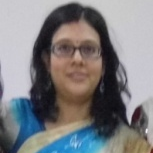
Rita Ganguly
Work place: Department of Computer Applications; Dr.B.C.Roy Engineering College; Durgapur: 713206; West Bengal; India
E-mail: ganguly.rita@gmail.com
Website:
Research Interests: Computational Engineering, Engineering
Biography
Rita Ganguly, received the M.Tech degree from the NIT, Durgapur ,India and entitled her name as a Research Scholar (Part-time) in Computer Science department(formerly known as Computer Application department.) ,NIT, Durgapur under the supervision of Dr. Anirban Sarkar. Presently she is working as an Asst. Prof of Computer Application Department, in Dr.B.C.Roy Engineering College, Durgapur, India.
Author Articles
Evaluation of Quality for Semi-Structured Database System
By Rita Ganguly Anirban Sarkar
DOI: https://doi.org/10.5815/ijcnis.2019.12.04, Pub. Date: 8 Dec. 2019
The quality evaluation of transactional calculus for semi-structured database system develops metrics for data quality. A conceptual data model of higher quality leads to a higher quality information system. Quality of a data model may affect with effectiveness i.e. the quality of results and the efficiency like time, effort etc. of development of information system. Hence, boosting up the data model quality is also prone to improve quality of delivered system. An array of metrics for quality has been proposed for the semi-structured data model with proper blend of metrics framework suitable for transactional calculus for data model of semi-structured. This paper proposes a framework for quality evaluation of transactional calculus for semi-structured database system using TCSS X-Query. In the proposed quality evaluation, the viewpoint has been described using a set of proposed quality measurements. Each of these quality measurements is linked with set of related metrics. The framework comprised of direct and indirect metrics for the purpose of quality evaluation. The framework facilities a double-fold view point using a set of quality measurement. In quality evaluation two viewpoint quality dimensions are focused: like designer level viewpoint and user level viewpoint. The proposed metrics set and measurements have been validated empirically. The purpose of empirical validation is to establish the metrics are practically useful for the assessment of quality measurements and operability factor.
[...] Read more.An Approach to Develop a Transactional Calculus for Semi-Structured Database System
By Rita Ganguly Anirban Sarkar
DOI: https://doi.org/10.5815/ijcnis.2019.09.04, Pub. Date: 8 Sep. 2019
Traditional database system forces all data to adhere to an explicitly specified, rigid schema and most of the limitations of traditional database may be overcome by semi-structured database. Whereas a traditional transaction system guarantee that either all modifications are done or none of these i.e. the database must be atomic (either occurs all or occurs nothing) in nature. In this paper transaction is treating as a mapping from its environment to compensable programs and provides a transaction refinement calculus. The motivation of the Transactional Calculus for Semi Structured Database System (TCSS) is-finally, on a highly distributed network, it is desirable to provide some amount of fault tolerance. The paper proposes a mathematical framework for transactions where a transaction is treated as a mapping from its environment to compensable programs and also provides a transaction refinement calculus. It proposes to show that most of the semi structured transaction can be converted to a calculus based model which is simply consists of a forward activity and a compensation module of CAP (consistency, availability, and partition tolerance) [12] and BASE (basic availability, soft state and eventually consistent) [45] theorem. It proposes to show that most of the semi-structured transaction can be converted to a calculus based model which is simply consists of a forward activity and a compensation module of CAP and BASE theorem. It is important that the service still perform as expected if some nodes crash or communication links fail, Verification of several useful properties of the proposed TCSS includes in this article. Moreover, a detailed comparative analysis has been providing towards evaluation of the proposed TCSS.
[...] Read more.Other Articles
Subscribe to receive issue release notifications and newsletters from MECS Press journals